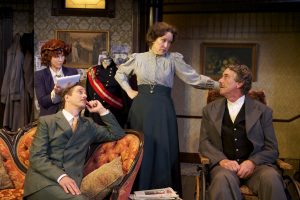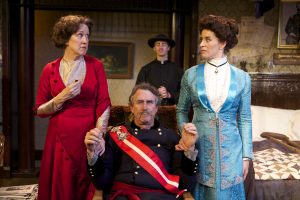Faded Glory Celebrates a Blackguard’s American History
Daniel Edgar Sickles’ life should have been a movie – or perhaps a television mini-series. It was certainly full of enough “stuff” to attract a star performer looking for Oscar bait. A self-appointed general in the Civil War, Sickles was a politician who held a variety of elective offices, a friend to presidents, particularly Presidents Buchanan, Polk and Lincoln, a skilled negotiator who served diplomatic assignments for the U. S. to Columbia, England, and Spain, and an out-and-out scoundrel who was censured for bringing a known prostitute onto the floor of the New York State Legislature, who managed to be acquitted of murdering the son of Francis Scott Key (“The Star Spangled Banner”) by pleading temporary insanity, and who became the secret lover of the deposed Queen Isabella II of Spain while attempting delicate negotiations with the government that had deposed her.
Even Sickles’ crowning accomplishment – winning the Congressional Medal of Honor – was tarnished by the perception that Sickle’s heroism was probably the byproduct of insubordination.
The Sickles story is the equivalent of a blackguard’s American history, and its sweep is all but guaranteed to enthrall.
It’s too bad, then, that Tim Burns’ play about Sickles, Faded Glory, now in its world premiere production at North Coast Rep, trades sweep for being shut up with a grumpy old man at the end of his life.
Set in the spring of 1914, only a short time before his death, Faded Glory explores Sickles’ (Andrew Barnicle) relationship with Eleanor Wilmerding (Shana Wride), his nurse. Irascibility has overcome Sickles, and while he’s able to recall and describe his exploits, the real action comes from the other characters, including Eleanor; her profligate cousin, Frank Butler (Ben Cole), and his friend, the actor, John Barrymore (Bruce Turk); a portrait painter the play names Lenott Parlaghy (Rachel VanWormer); and Sickles’ second wife, who the play names only as Condesa (Frances Anita Rivera). Sickles spends much of the play wondering why the Condesa has moved in down the street from him, and he also frets about his Medal of Honor being rescinded and keeps referring to his campaign to have it restored to him.
Despite his self-description as a “history buff,” Mr. Burns’ play gets some of its history wrong. First, Sickles’ portrait was not painted by “Lenott Parlaghy” but by the well-known Hungarian artist, Elisabeth von Parlaghy, who was briefly married to the Russian Prince Lwoff and who styled herself as “Princess Lwoff-Parlaghy.” Second, some Medals of Honor were “rescinded” after criteria for awarding them were made more stringent and other awards for military valor were added, but the investigation that led to the rescission didn’t begin until 1916, two years after Sickles’ death. Finally, Mr. Burns implies that a key to understanding Sickles’ psychology was that he never had a son, a point that appears to play fast and loose with the facts. I’m being deliberately vague here, but after you’ve seen the North Coast Rep production, read Cormac O’Brien’s essay on Sickles in Secret Lives of the Civil War: What Your Teachers Never Told You about the War Between the States. This book is easily found online and adds a key detail about Sickles’ marriage to the Condesa that the play omits.
Now, I’ve been pretty hard on this portrayal of Sickles, but Faded Glory does have its charms. Mr. Burns may have disposed Sickles as his Pirate King, but he’s installed Barrymore in the role and Mr. Turk plays him to the hilt. Mr. Cole is awfully funny as the drunk Frank Butler and Ms. VanWomer takes an inconsistently written role and makes an interesting character out of it. And, Ms. Wride walks away with the play as she deftly creates a woman of depth and complexity who loves Sickles’ despite his constant criticism of everything around him, including her. [php snippet=1]From a production standpoint, North Coast Rep has done well by Mr. Burns. Marty Burnett’s scenic design, complimented by Mr. Cole’s property design, provides a number of clues to the mania that has overcome Sickles, and Matt Novony’s lighting design and Melanie Chen’s sound design are models of subtle pleasure. Sonia Elizabeth Lerner and Peter Herman have done a fine job designing period costumes, hair, and wigs. Overseeing the proceedings, director David Ellenstein keeps them lively, provides space for his actors to do excellent work, and doesn’t let the abundance of laugh lines overwhelm the pathos of the situation.
All in all, it’s an excellent production of a play that needs work. Don’t let the problems with the script keep you away – you’ll miss the opportunity to enjoy some fine acting and stagecraft.
[box] Faded Glory runs May 28 – June 22 at the North Coast Repertory Theatre (see below for address and contact information). The theatre is located in a shopping center just east of I-5, and there is ample free parking available. Ticket prices range from $37 – $54, and discounts for seniors, students, and military are available. The performance runs about 2 hours and 15 minutes including an intermission.
DOWNLOAD CAST AND CREDITS HERE [/box]

In addition to reviewing theatre for San Diego Story, Bill also reviews for TalkinBroadway.com. He is a member of the San Diego Theatre Critics Circle and the American Theatre Critics Association. Bill is an emeritus professor in the School of Journalism and Media Studies at San Diego State University.




